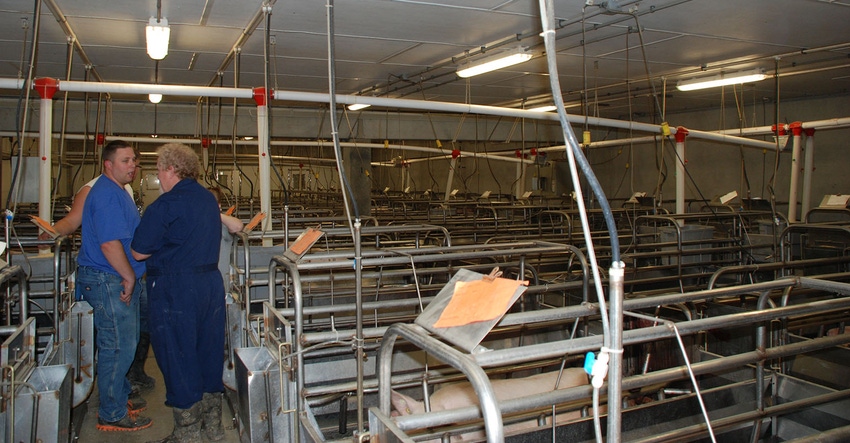Attracting and retaining talent through culture
By creating a culture of "Farm First Focus" you clearly signal to everyone in the business where their focus should be.
December 28, 2021

Headlines continue to report on historic labor shortages and the "Great Resignation" in our country as we continue to grapple with the new reality of the labor market in the United States. The pork industry has not been spared and some might argue rural communities and livestock producers in particular, have been hit harder than most by the challenges finding qualified, willing talent to work in our farms and businesses. Like anything in life, variation exists in the experience that employers, departments or farms have had over the past two years, and often times the differences can be attributed to one thing – culture.
The old saying goes, people don't leave organizations, they leave leaders; however another way of saying this is people don't leave organizations, they leave cultures. Culture is defined as a shared set of values, beliefs, goals and ultimately a strategy that is woven into an organization and creates an identity not only for the business, but for those who work in the business. When talent is in demand, culture can be the defining characteristic that not only allows a business to attract great people, but most importantly, retain them.
At Carthage Veterinary Service and Professional Swine Management, we have invested a great deal of time in understanding and developing our company culture. Culture is created through accountability, transparency, candor and community. Each of these is critical for creating an environment that is not only attractive to prospective employees, but most importantly a place that employees do not want to leave.
We strive to be an organization that thinks of the farm first in everything that we do. The hard working people, producing high quality pork that we work with on a daily basis are our No. 1 priority. For us to serve them better we also have to be focused on continuous improvement and innovation. Innovation and progress are driven through a culture of accountability and ownership within our team that provides the freedom to move quickly and implement solutions that will drive value on the farm.
Lastly, we take great pride in the vibrant rural communities we are a part of, and we work hard to make sure we are doing our part to develop and support these communities. The job market is highly competitive, and unprecedented wage levels are being offered, so to truly differentiate we have to focus on something you can only get in Carthage – our culture.
"Farm First Focus"
Organizations often resemble sports teams in terms of roles and responsibilities. Each of us contributes to organizational performance in different ways and highlighting the revenue generating departments in any business helps support departments focus on what they do best, putting our revenue generators in the best position to succeed.
Pig production is no different, our farm managers and caregivers are the core of how we protect and manage our product. Every other aspect of a farming operation exists to support our farms. Simply put, no matter how great our office team may be, if our farm managers and caregivers don't hit their targets our pig production business will struggle.
By creating a culture of "Farm First Focus" you clearly signal to everyone in the business where their focus should be. No matter how the problem at the farm got started, it's all of our problem to fix.
The words "Farm First Focus" mean nothing if they are not followed up on through actions and deeds. The farm has a problem? You need to take that call. Even if it isn't normally your problem to handle, you have to engage with the farm and support their efforts toward a solution. This may simply mean you connect the farm to the appropriate expert to help them, but the culture only exists if all employees buy in and "walk the talk" of "Farm First Focus."
Progress, innovation through accountability, transparency
One of the aspects of our culture that our employees enjoy is the entrepreneurial spirit and freedom to work on initiatives that drive value and innovation in our business and for our clients. We feel it is a critical component to our success and we encourage our team to take ownership for their components of the business.
Often times innovation and creativity can be stifled by red tape or having to constantly ask for permission. Finding the right balance between freedom to operate and governance can be tricky, but we tend to err on the side of flexibility and trust our team members to make good decisions within their respective areas of the business. Allowing this level of freedom not only allows the business to move quickly when it comes to opportunities for innovation, but it creates a culture of accountability.
Accountability sometimes has a negative connotation, however we view it as an opportunity to own the outcomes and processes within the part of the business our team members are responsible for. This in turn drives the entrepreneurial spirt that creates a nimble team focused on innovation and progress.
Communication and transparency are also key components of making this culture work. Each of the departments and areas of the business has to know what the others are working on to ensure we are all working towards the same over-arching goals. The culture is fast paced at Carthage, but when everyone is accountable and communicating, the rope is always being pulled in the same direction. This accountability connects people to a common cause and makes working hard with a purpose rewarding and ultimately enjoyable.
Community involvement
Farms always have been and always will be pillars of rural communities. While most businesses shun rural areas, taking their jobs, revenues and tax dollars with them to the cities and suburbs, our farms maintain their presence in our communities as both customers and employers.
It is critical that the community be capable of supporting a farm operation — farms need employees, maintenance, accounting services and numerous other functions they outsource. Regular communication between farm ownership groups and their local communities can help ensure partnerships that are persistent beyond temporary challenges and that the community collectively works together to strategically place infrastructure where it's needed.
It can be easy for farms to not be seen in the community. Our biosecurity restrictions are critical to protect animal health but hinder farm visits to help those citizens who don't work on a farm understand what we do. Because of this, farm operations have to be intentional about being involved in community functions.
At CVS/PSM we have a history of hosting an annual Easter celebration at our business campus — our employees stuff and hide eggs for a community Easter Egg Hunt and we invite anybody and everybody to participate. This is one of many examples where we specifically interact with the community to show our thanks and appreciation for the partnership that sustains not only our business, but many other businesses within our community.
When asked what someone looks for in an organization, many employees will say things like "opportunities for advancement," "great benefits," etc. However, when you dig deeper, they will often express a desire to be a part of something greater than themselves that has impact on the communities they live in, the people they work with and ultimately makes the world a better place. These things are all elements of a great culture.
It takes constant focus and hard work to develop and maintain a great culture, and once you have it you must stay true to its elements. Great people seldom leave great cultures, and great businesses are made up of great people. Surround yourself with great people, create a culture of empowering them to achieve collective goals and your business will thrive even in the face of challenging labor environments.
Beau Peterson is the general manager and Ted Ufkes is the chief operating officer at Carthage Veterinary Service and are solely responsible for the information provided, and wholly own the information. Informa Business Media and all its subsidiaries are not responsible for any of the content contained in this information asset.
You May Also Like



